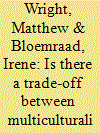| Srl | Item |
| 1 |
ID:
113539


|
|
|
|
|
| Publication |
2012.
|
| Summary/Abstract |
Across immigrant-receiving democracies on both sides of the Atlantic, policies of "cultural recognition" (e.g., "multiculturalism") have become a convenient punching-bag for political elites. Among academics, heated theoretical debates exist over whether such policies foster or hinder immigrants' engagement with their adoptive nation. We provide a novel empirical assessment of this debate from the immigrant perspective. We ask how multicultural and citizenship policies influence immigrants' socio-political engagement with their adoptive nation in three realms: social inclusion, political inclusion, and political engagement. Using a variety of cross-national and single-country surveys, we show that multiculturalism in no case hinders engagement with society and government, and in many cases seems to foster it. Thus, the claim that multiculturalism undermines immigrants' socio-political integration appears largely without foundation.
|
|
|
|
|
|
|
|
|
|
|
|
|
|
|
|
| 2 |
ID:
099173


|
|
|
|
|
| Publication |
2010.
|
| Summary/Abstract |
The war that ravaged Liberia between 1989 and 2003 had myriad causes and belligerents, but there can be little question of the demographic cohort that provided the manpower for the war machine: youth. Young, disconnected Liberians became easy recruits to the conflict's warring factions as they sought a sense of importance and independence away from the cultural background that marginalized them. Building on qualitative field research in Liberia, this article bridges its primary case study with theory and secondary data, to examine the threat of post-war re-marginalization and disengagement of youth in the country. The article argues that economic reintegration programmes have not addressed issues of youth empowerment directly enough, and that targeted political and social engagement strategies from a vertical and horizontal integration perspective would be more effective in the re-engagement of youth in civilian life.
|
|
|
|
|
|
|
|
|
|
|
|
|
|
|
|